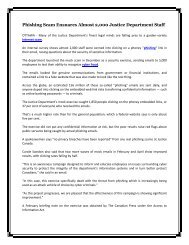Fraudulent transactions on lost or stolen cards are up
Create successful ePaper yourself
Turn your PDF publications into a flip-book with our unique Google optimized e-Paper software.
<str<strong>on</strong>g>Fraudulent</str<strong>on</strong>g> <str<strong>on</strong>g>transacti<strong>on</strong>s</str<strong>on</strong>g> <strong>on</strong> <strong>lost</strong> <strong>or</strong> <strong>stolen</strong><br />
<strong>cards</strong> <strong>are</strong> <strong>up</strong><br />
Card fraud was <strong>up</strong> 16 per cent to $304 milli<strong>on</strong> in 2013, and the number of <str<strong>on</strong>g>transacti<strong>on</strong>s</str<strong>on</strong>g> <strong>on</strong> <strong>lost</strong> <strong>or</strong> <strong>stolen</strong><br />
<strong>cards</strong> rose 26 per cent to $34 milli<strong>on</strong>.<br />
The vast maj<strong>or</strong>ity of the fraud was d<strong>on</strong>e <strong>on</strong>line, accounting f<strong>or</strong> $219.7 milli<strong>on</strong>, <strong>up</strong> 20 per cent <strong>on</strong> 2012,<br />
acc<strong>or</strong>ding to the latest figures from payments industry body the Australian Payments Clearing<br />
Associati<strong>on</strong>.<br />
But since 2010, the number of fraudulent <str<strong>on</strong>g>transacti<strong>on</strong>s</str<strong>on</strong>g> f<strong>or</strong> smaller amounts <strong>on</strong> <strong>lost</strong> <strong>or</strong> <strong>stolen</strong> <strong>cards</strong><br />
appears to have jumped dramatically.<br />
The total number of <str<strong>on</strong>g>transacti<strong>on</strong>s</str<strong>on</strong>g> made <strong>on</strong> Australian <strong>lost</strong> <strong>or</strong> <strong>stolen</strong> <strong>cards</strong> rose 94 per cent in 2013 to<br />
162,896.<br />
Since November last year, Vict<strong>or</strong>ia Police have maintained that data they have compiled shows the<br />
explosi<strong>on</strong> in the use of tap and go <strong>cards</strong> in Australia is to blame f<strong>or</strong> a rise in break-ins and bag snatching<br />
to steal c<strong>on</strong>tactless <strong>cards</strong>.<br />
However – after extensive c<strong>on</strong>sultati<strong>on</strong> with police – internet security experts, banks and card<br />
companies say they d<strong>on</strong>’t agree.
A spokeswoman f<strong>or</strong> MasterCard said an industry w<strong>or</strong>king gro<strong>up</strong> <strong>on</strong> c<strong>on</strong>tactless payments had compiled<br />
data <strong>on</strong> fraud using tap and go <strong>cards</strong>.<br />
It said tap and go fraud accounts f<strong>or</strong> “less than 2 per cent of total card fraud”, while c<strong>on</strong>tactless<br />
<str<strong>on</strong>g>transacti<strong>on</strong>s</str<strong>on</strong>g> have grown by 350 per cent between 2012 and 2013.<br />
“We d<strong>on</strong>’t see that in the statistics and it just doesn’t make sense to us that c<strong>on</strong>tactless is the driver of<br />
fraud,” said Chris Hamilt<strong>on</strong>, chief executive of APCA. “Yes, c<strong>on</strong>tactless <strong>cards</strong> can be <strong>stolen</strong> and used f<strong>or</strong><br />
fraud, but they <strong>are</strong> no m<strong>or</strong>e likely to c<strong>on</strong>tribute to the fraud statistics than n<strong>on</strong>-c<strong>on</strong>tactless.”<br />
Mr Hamilt<strong>on</strong> said the cap <strong>on</strong> the amount that could be withdrawn automatically limited the value of<br />
fraud <strong>on</strong> tap and go <strong>cards</strong>.<br />
“You can’t go out and buy a flat screen TV with these <strong>cards</strong>, f<strong>or</strong> instance” he said. “The propositi<strong>on</strong> that<br />
they <strong>are</strong> driving fraud must derive from a propositi<strong>on</strong> that criminals <strong>or</strong> fraudsters <strong>are</strong> targeting these<br />
<strong>cards</strong>, and can’t see that that is likely.”<br />
He also pointed to a similar shift in fraud from card skimming to card theft in the UK when chip <strong>cards</strong><br />
were brought in there. Unlike Australia, though, c<strong>on</strong>tactless <strong>cards</strong> were not brought in at the same time.<br />
“Our suspici<strong>on</strong>s <strong>are</strong> that it is m<strong>or</strong>e to do with the fact that counterfeit card skimming is under c<strong>on</strong>trol,”<br />
he said.<br />
Fraud from details skimmed from <strong>cards</strong> and used <strong>on</strong> counterfeit <strong>cards</strong> has fallen by 33 per cent since<br />
2008, although it was unchanged at $37.2 milli<strong>on</strong> between 2012 and 2013.<br />
Pat Boyle, Vict<strong>or</strong>ia Police’s head of fraud, told The Australian Financial Review earlier in June that he<br />
would review new c<strong>on</strong>tactless fraud data that banks <strong>are</strong> compiling.<br />
“We need to build <strong>up</strong> trust and I need to build <strong>up</strong> knowledge, so I am c<strong>on</strong>fident I have the right<br />
inf<strong>or</strong>mati<strong>on</strong> when I brief people,” he said.<br />
Mr Hamilt<strong>on</strong> said the main focus needs to be <strong>on</strong> <strong>on</strong>line fraud because it is growing and accounts f<strong>or</strong> the<br />
greatest amount. He said banks, merchants and individuals all had a resp<strong>on</strong>sibility and an interest in<br />
reducing fraud.<br />
Alastair MacGibb<strong>on</strong>, Direct<strong>or</strong> of the Centre f<strong>or</strong> Internet Safety at the University of Canberra, said<br />
business and individuals need to do m<strong>or</strong>e to detect fraud and secure credentials.“We need to secure our<br />
computers m<strong>or</strong>e, and imp<strong>or</strong>tantly businesses need to be using better fraud detecti<strong>on</strong> technology to see<br />
if they <strong>are</strong> using <strong>stolen</strong> <strong>cards</strong>,” he said. He said the technology is readily available to do this.<br />
“Businesses do need to develop their skill sets f<strong>or</strong> <strong>on</strong>line fraud. [They] <strong>are</strong> losing m<strong>on</strong>ey through this<br />
type of fraud.”




